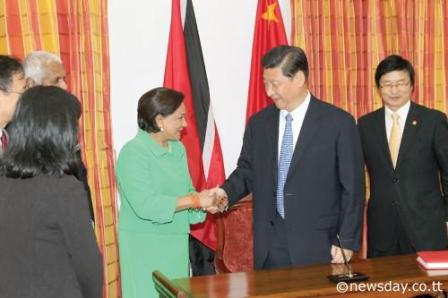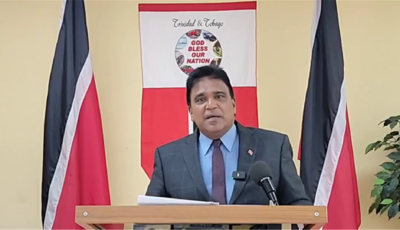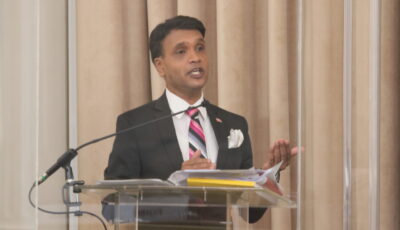Benefits for TT from Biden, Xi Jinping visits

Prime Minister Kamla Persad-Bissessar greets President of China, Xi Jinping at the start of a two-day State visit to Trinidad and Tobago yesterday.
Author: RATTAN JADOO
International relations experts say United States vice-president Joe Biden’s whirlwind visit to Trinidad and Tobago, early last week, will ultimately benefit this country, if only to eliminate doubt that the US influence in the region had waned.
“The summit has been hastily put together, perhaps as a means of upstaging the visit of the Chinese President…The US is concerned about its waning influence,”said Dr Raymond Mark Kirton, senior lecturer in the Institute of International Relations, St Augustine Campus of the University of the West Indies.
Kirton suggested that Biden’s visit, as part of a three-nation Latin American tour, reflected the “changing geo-political space in which we (Trinidad and other Caribbean islands) were operating.”
Using China as an example, Kirton noted that that country was intent on becoming a force not only in TT but within the region.
“China is now engaging the Caribbean in a sustained way and there is concern on the part of the US that they may not continue to be the preferred port of call although they are still the Caribbean’s major trading partner,” he said in an interview on Wednesday.
Chinese President Xi Jinping’s visit to this country ends today. It marked the first visit of a President of the People’s Republic of China to the English-speaking Caribbean.
During the visit, Jinping signed an economic and trade agreement with the TT Government in a move which he hoped would strengthen bilateral relations and deepen co-operation between the two countries.
China has been collaborating with TT in the fields of natural resources, transportation, environment and medical facilities over the years.
Jinping’s visit followed Biden’s two-day summit in which the US vice-president addressed several issues affecting US-Caricom relations: the drug trade; citizen security; immigration reform; natural disasters, trade investments and education.
Biden also pledged US support to TT in the area of information communications technology and the supply of de-commissioned naval vessels to assist in the war against crime, locally and perhaps throughout the Eastern Caribbean.
Dr Michele Reis, a lecturer at the Institute of International Relations, regarded Biden’s visit as “timely and extremely important” on two fronts.
Like Kirton, she referred to criticisms that the US was paying less attention to the Latin American and Caribbean region and secondly, its concerns about the emergence of other players, “some non-traditional and even from within the hemisphere itself.”
“These visits are a welcome opportunity to reaffirm mutual interests, especially in the area of security and drug-trafficking,” said Reis.
“In relation to security, the region is particularly prone to a number of threats that are now encompassed under a widened definition of security including human security (irregular migration-asylum-seekers, trafficked victims) and deportees; as well as existential threats such as climate change and the effects of global warming.”
Reis said Biden’s visit also gave the Caribbean an opportunity to show a more united front with the presence of the Dominican Republic, which is not a Caricom member.
Trade, crime and issues relating to human and social development were high on the agenda during Biden’s visit, issues not talked about or discussed in any comprehensive way over the past years but Reis dismissed the notion that this was simply a talk-shop.
“Most certainly not,” she insisted.
“While they are costly and cause a great deal of disruption to the every day life of the average citizen, there are invaluable benefits to be derived from such exchanges. Well organised ones such as the Fifth Summit of the Americas again put TT squarely on the international map as a small player capable of punching above its weight.”
She said the most obvious benefit from Biden’s visit was the dialogue with the dominant bilateral partners on issues relevant to TT and its Caricom neighbours.
She singled out deportation as one of the critical issues.
Reminding that Caricom failed to have a common, unified approach to dealing with the problem as it did several years ago during then President Clinton’s visit to Barbados, she said:
“This could have saved us some of the direct effects of huge numbers of deportees being sent back to our small countries years ago. Now we are far worse off, with no co-ordinated approach to the problem, so the visit gives us a chance to revisit the issue and place it on the front burner. “Jamaica is particularly affected by deportation and unfortunately, with the threat of disruption in funding by the British, will have even greater problems in attenuating the negative fallout from reinserting these returnees to countries that are in many ways foreign lands, which damage the social fabric of the various nations.”
Jinping’s visit, Reis said, was also extremely significant.
“The visit of the Chinese President is extremely significant. This country has had long-standing relations with China spanning several decades. The presence of descendants of Chinese immigrants for more than two centuries links the two countries irrevocably,” she said.
In the contemporary context, Reis said, China has shown a renewed interest in the Caribbean for varying reasons.
“In the case of TT, significant energy resources make this country attractive to one of the world’s emerging players. Even though the construction projects employing Chinese expatriate labour have slowed, new arrivals of Chinese in the country and other parts of the Caribbean signal opportunities to explore new economic opportunities and solidify existing ones,” said Reis. Kirton, whose expertise includes Latin America and the Caribbean, said the benefits derived from Biden’s visit as well as previous international summits, hosted in this country, must be viewed holistically.
“We have to look at the context in which these meetings were held and how they redound to the benefit of this country in terms of our strategic positioning in the region. They could have a positive outcome… Trinidad has benefitted from an enhanced profile,” he said, alluding to the Fifth Summit of the Americas and the Commonwealth Heads of Government Meeting (CHOGM), both of which were held in this country in 2009.
Kirton said the establishment of the Caribbean and Latin American Caribbean States (CELAC), which was established on December 3, 2011, was directly influenced by the Fifth Summit of the Americas. The organisation seeks to deepen integration within the Americas by minimising the once overwhelming influence of the US on the politics and economics of Latin America.
“That summit brought Latin America and the Caribbean closer together and CELAC came out of the renewed vigour of the conference,” Kirton said.
“The leaders in the hemisphere were given an opportunity to move the process forward and it created a window of opportunity for closer collaboration.”
The Fifth Summit of the Americas, which focused on the theme, “Securing Our Citizens’ Future by Promoting Human Prosperity, Energy Security and Environmental Sustainability,” was billed as a platform for hammering out critical issues at the time. Chief among these were the global economic crisis, energy security, human prosperity and environmental sustainability.
But, more than four years later, some observers contend that the country has not truly capitalised from the summit.
Reis disagrees.
“Undoubtedly, organising the Summit of the Americas was an opportunity for a small country such as ours to be placed on the world stage,” she said.
“To undertake such a task and to have done it so creditably put Trinidad and Tobago and by extension, the Caribbean, in an extremely favourable light.
“We created history by becoming the smallest country to have hosted such a significant event bringing together a wide range of players from the hemisphere, of varying size in terms of geography, population and economy.”
Reis recalled that the four previous summits were held in Miami, United States (1994); Santiago, Chile (1998), Quebec City, Canada (2001); and Mar del Plata, Argentina (2005).
“So, it mattered not only for exposure but also in relation to the number of bilateral meetings that took place on the fringes of the Summit itself,” she added. CHOGM, Reis said, followed in a similar vein.
“Regarding the benefits of CHOGM, international visibility for such a small state is the primary and obvious benefit, coupled with the exposure that such an international event brings. This was even more of a feat, given the fact that CHOGM came so swiftly on the heels of the Summit of the Americas,” she said.







